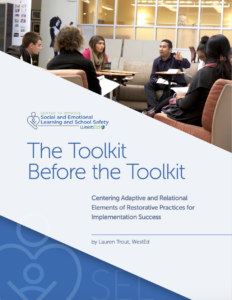The Toolkit Before the Toolkit: Centering Adaptive and Relational Elements of Restorative Practices for Implementation Success
Lauren Trout; Center to Improve Social and Emotional Learning and School Safety
Accompanying Resources:
- Brief: A Reflective Process for Working Through Complex Restorative Practice Dilemmas in Schools
- Audiocast: Centering Adaptive and Relational Elements of Restorative Practices as Tools for Implementation Success
- Audiocast: Restorative Practitioners Panel
Restorative practices hold significant promise for school transformation. However, because of the widespread popularity of their restorative justice component, many educators mistakenly assume that restorative practices are merely responsive, focused on repairing harm to relationships as an alternative to traditional disciplinary approaches that focus on punitive responses to rule infractions.
On the contrary, restorative practices are characterized by proactive relationships, connection, and community transformation. As such, effective implementation of restorative practices rests not merely on getting their technical aspects right, but far more on the often overlooked adaptive and relational elements that are necessary to achieve authentic, meaningful, and sustainable implementation.
By highlighting the mindsets, values, social capital, and structural supports that bind and hold together restorative practices, this guide provides educators, school leaders, and district administrators with the strategies, tools, and structural supports they need to successfully implement restorative practices and transform their schools into strong communities with meaningful relationships, a sense of authentic belonging, and equitable whole-person outcomes.
